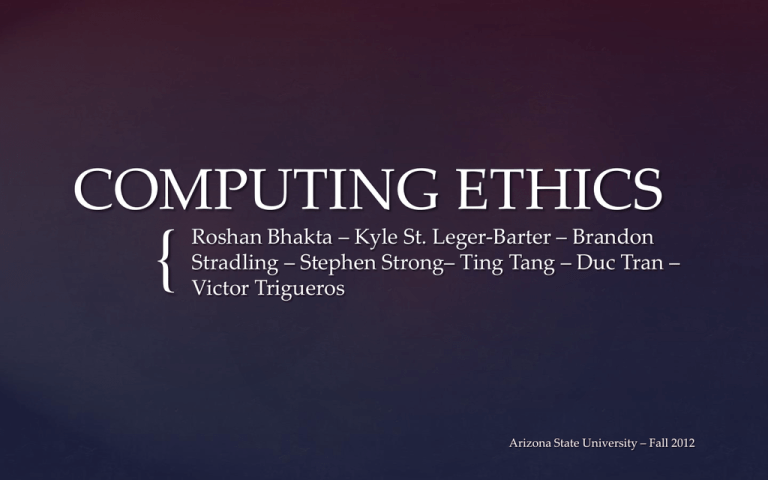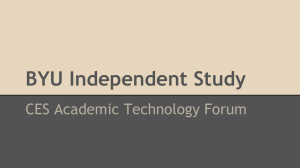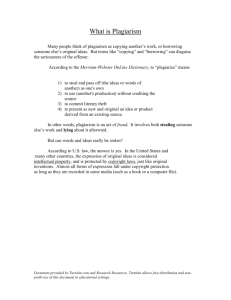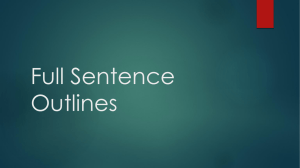presentation 1
advertisement

COMPUTING ETHICS
{
Roshan Bhakta – Kyle St. Leger-Barter – Brandon
Stradling – Stephen Strong– Ting Tang – Duc Tran –
Victor Trigueros
Arizona State University – Fall 2012
Artificial Intelligence
The Digital Divide
Plagiarism in Education
Conclusion
Discussion
References
Overview
"The science and engineering of making
intelligent machines, especially
intelligent computer programs”
"Related to the similar task of using
computers to understand human
intelligence”
– John McCarthy
Artificial Intelligence
1956 – The field of AI research was
founded at the Dartmouth Conferences.
1963
– ARPA funds McCarthy's AI
research
1965 – ELIZA, a program that can talk to
users on any topic, was created at MIT.
1968 – MIT's MacHack became the first
program to play in human chess
tournaments.
History
1970s – The expert system Mycin was
developed; could provide medical
analysis with a knowledge base
1991 – DARPA's DART was deployed in
the Gulf War
to optimize logistical
problems.
2011 – IBM's Watson defeats Brad Rutter
and Ken Jennings in Jeopardy!
History
AI – Military Applications
WW2 Gun director
Target identification
Guided missiles
Unmanned Aerial Vehicles (UAV)
XM-25
Automated robots may be deployed in 20
years
Military Applications
Automated robots would reduce the
number of human casualties, but robots
would be left to make decisions on their
own.
Concerns
over whether an AI can
distinguish between civilians and
combatants.
Concerns of Military Use of AI
No clear way to determine who is
accountable for a mistake made by AI
Human Rights Watch calls for the ban of
production of these "killer robots”
Concerns of Military Use of AI
Is the use of AI (e.g. guided missiles and
sentry guns) a person using a tool to kill
the enemy, or is it the AI who is doing the
killing?
Is it ethical to lay the blame of attacking
enemies on the AI program?
To what extent can we replace humans
with AI and robots in war?
Ethical Concerns
AI - Threat To Human
Privacy and Dignity
Websites use cookies from Google
Adsense to determine which ads to
display.
AI data-mining allows vendors to
advertise products you'd most
likely buy.
Internet Privacy
Facebook tracks user data
using cookies, Javascript,
1-pixel beacons, & Iframes.
They pull personal data
from external websites
Internet Privacy
Police stations can track your cell
phone.
Gilbert Police Dept. have installed a
system that can track the location of
your cell phone unless it is turned
off.
In LA Police have cloned phones
and
downloaded
their
text
messages.
Cell Phone Privacy
According to previous Google CEO Eric Schmidt
Young people will someday be allowed to change
their name to distance themselves from material
gathered on them from social media sites.
Eventually Google will know so much about its
users that it will be able to help people plan their
lives.
"I actually think most people don't want Google to
answer their questions. They want Google to tell
them what they should be doing next."
Ex: Google could remind you what groceries you'd
like to buy when passing a shop.
AI & Privacy
Is it ethical to sacrifice our privacy in order to
obtain a higher quality of life?
Do we need to redefine what is considered
private and public data?
Will it be possible to prevent private data from
getting into the wrong hands?
Ethical Concerns
Joseph Weizenbaum
German-Jewish refugee to the US in 1936.
Very influential in the computer world.
Professor of Computer Science at MIT.
Wrote a simple AI in 1966 called ELIZA.
Felt that computers are incapable of having
feelings like humans, which he argues is an
important
characteristic
when
making
judgment calls
AI & Human Dignity
young woman: Men are all alike.
eliza: In what way?
young woman: They're always bugging us about something specific or
other.
eliza: Can you think of a specific example?
young woman: Well, my boyfriend made me come here.
eliza: Your boyfriend made you come here?
young woman: He says I'm depressed much of the time.
eliza: I am sorry to hear you are depressed.
...
eliza: What else comes to mind when you think of your father?
young woman: Bullies.
eliza: Does that have anything to do with the fact that your boyfriend
made you come here?
ELIZA
Is it ethical to have AI working
in positions such as:
Judge
Police Officer
Customer Service
Therapist (such as ELIZA)
Ethical Concerns
Robo-Ethics
A robot may not injure a human being or,
through inaction, allow a human being to
come to harm.
A robot must obey the orders given to it by
human beings, except where such orders
would conflict with the First Law.
A robot must protect its own existence as
long as such protection does not conflict with
the First or Second Laws.
Three Laws of Robotics
Artificially intelligent beings have a
capability to execute actions on its own
initiative
Ownership and Liability
Who would be liable for the actions?
Punishment and Punitive Damages
Owners can be punished and pay damages
Do machines feel pain to be punished?
Can
behavior
be
adjusted
through
punishment?
AI Accountability
Responsibility and accountability implies
understanding of consequences
Artificially
intelligent beings are
endowed with inalienable rights
Limitation of rights
Procreation: Can robots make more
sentient robots?
Suffrage: Can a robot be President?
AI Rights
Looking Ahead With AI
Artificial Intelligence has potential to further
enrich our lives in the future:
Medical
allow doctors to have better information
Legal
potential for unbiased decisions
Educational
education tailored to individual needs
Looking Ahead
What privacy issues will we encounter in the
future as AI continues to advance?
Even though AI has the potential to further
enrich our lives, does society want or need
these services, especially considering the
potential loss of rights and privacy?
Looking Ahead
The Digital Divide
It is the gap between people who have
access to digital technology – such as
computers, Internet, mobile phones, etc. –
and those who have very limited access
or have no access at all.
What is Digital Divide?
"Only 30 percent of the world population currently has access…"Global Post
World Connection Density
Internet Users / 100
“The illiterate of the 21st century will not be
those who cannot read and write, but those who
cannot learn, unlearn, and relearn. ”
Alvin Toffler
In the past - Classified as those have
access to internet and those who don't.
Now - Classified as those to have access
to technology and those to don't.
Past & Present
Lack of technological skills
Imposed restrictions
Lack of access or resources
People lacking opportunities
Why Does it Exist?
US Average 2011
People under 18
13.7%
People ages 65+
Poverty!
22%
People 19–64
15.9 %
9%
Because these are the people that
desperately need access to the internet,
the ones that would benefit most from
the resources available online (e.g.
Medicare, Social Security information, job
searching …)
Why Poverty is of Major Concern?
The United Nations has ruled that
Internet access is a basic human right that
should be guaranteed and protected by
states.
The government has allocated $7.2 billion
for broadband development as part of the
stimulus package.
Bridging the Gap
Access to Technology through Schools
Nearly universal in the U.S.
No Child Left Behind
Telecommunications Act of 1996
Bridging the Gap
Libraries – Public access to the Internet
Total – 121,785
9225
99180
3689
8313
Bridging the Gap
280
1098
Denial of Access
Blocking & Filtering
21 states have Internet filtering laws for public
schools or libraries
Internet Use Policies
Filtering Software
Ethical Concerns
Children’s Internet Protection Act
(CIPA)
Requires the use of filtering software to
block access to websites with offensive
photos or materials (In order to
participate in the E-Rate program to
receive financial support from the
government).
Denial Of Access
National Coalition Against Censorship
Filtering: Limits the free exchange of ideas
Filtering operates by keywords, many
studies suggest frequent examples of
over blocking.
Content Filtering
Plagiarism in Education
With the arrival of the internet and the
'information age', the definition of
plagiarism is changing
Some students construe Wikipedia as
'common knowledge'
Only 29% of students think copying from
web is 'serious cheating'
Evolving Definition
Growing disconnect between concepts of
intellectual property, copyright and
originality
40% of undergrad students admitted to
copying 'a few sentences'
Evolving Definition
Students are sitting at the same computer
they may download music and movies
with.
Students aren't grabbing a physical copy
of a reference from a library anymore,
and may make it easier for a student to
feel like the source 'belongs' to them
instead of 'borrowing' it.
What’s causing the change in perception of
plagiarism?
Students are mixing-and-matching with
easily copied-and-pasted sources, rather
than "engaging in the writing process."
What’s causing the change in perception of
plagiarism?
Many forms of academic dishonesty in
CS: student collaboration, copying code
from online sources.
Plagiarism
of students' programs is
harder to detect than ordinary plagiarism
in writing.
Plagiarism in software related degrees.
Cognitive dissonance within CS programs:
students are told not to collaborate on certain
projects or in certain classes, yet in other
projects (and in industry) you are
encouraged to take others' code and
modify/improve as needed.
The advent of open source projects available
on sites like bitbucket and github also blur
the identity of plagiarism in CS courses.
Plagiarism in software related degrees.
TurnItIn.com - a site which checks for
plagiarism against a database of collected
papers and sources.
Students are often required to upload
their projects to sites like TurnItIn in
order to receive a grade.
How are Schools dealing with evolving
plagiarism?
However, it has been argued that turning in a
paper to TurnItIn.com creates a 'presumption
of guilt' - which means you are guilty until
proven innocent, which may conflict with
local and scholastic laws and/or codes of
conduct.
There have also been complaints of student
copyright abuse because it stores papers in
the TurnItIn database permanently
How are Schools dealing with evolving
plagiarism?
Jesse Rosenfield, student at McGill U,
declined to submit work to TurnItIn.
University Senate decided they were to be
graded without TurnItIn.
Princeton, Harvard, Yale and Stanford have
banned use of TurnItIn.
2007, two high school students from Desert
Vista High School sued iParadigms,
TurnItIn's parent company, but the decision
went in favor of the company both in the first
decision and in the court of appeals.
Litigation Involving
Artificial Intelligence
The Digital Divide
Military, Privacy, Robo-Ethics
Poverty, Bridging the Gap, Denial of Access
Plagiarism in Education
Evolving Definition, Software, Schools, Litigation
Conclusion
I.
II.
Is it ethical to bypass Web filtering
software placed by schools in order to
reach a website which has no direct
offensive content?
With many people supporting claims of
dismissing software patents, is it ethical
holding patent to a software which
contains ideas present elsewhere?
Discussion Questions
http://www.nytimes.com/2010/08/02/e
ducation/02cheat.html?pagewanted=a
ll&_r=0
http://en.wikipedia.org/wiki/Turnitin
http://www.thecrimson.com/article/20
06/5/4/fighting-plagiarism-schools-gohigh-tech-what/
http://courses.cs.vt.edu/~cs3604/suppo
rt/Debates/Scenarios.html
http://www.cs.utsa.edu/~wagner/pubs
/plagiarism0.html
http://en.wikipedia.org/wiki/Ethics_of
_artificial_intelligence
http://en.wikipedia.org/wiki/Joseph_
Weizenbaum#cite_note-2
References
http://en.wikipedia.org/wiki/Digita
l_divide
http://www.google.com/policies/pri
vacy/ads/
http://www.theglobeandmail.com/t
echnology/dear-valued-customerthank-you-for-giving-us-all-yourpersonal-data/article582786/
http://www.homelandsecuritynews
wire.com/dr20120404-aclu-cellphone-tracking-by-policewidespread
http://www.stanford.edu/group/SH
R/4-2/text/dialogues.html#note7
http://www.businessinsider.com/this-ishow-facebook-is-tracking-your-internetactivity-2012-9?op=1
http://wwwformal.stanford.edu/jmc/whatisai/node1.
html
http://en.wikipedia.org/wiki/History_of_
artificial_intelligence
Pentti O. Haikonen, Robot Brains:
Circuits and Systems for Conscious
Machines
http://en.wikipedia.org/wiki/Timeline_of
_artificial_intelligence
http://www.gizmag.com/xm-25-us-armysmart-weapon/11807/
http://www.taibahu.edu.sa/iccit/allICCIT
papers/pdf/p30-siddiqi.pdf
References
http://www.telegraph.co.uk/technolog
y/google/7951269/Young-will-have-tochange-names-to-escape-cyber-pastwarns-Googles-Eric-Schmidt.html
http://phys.org/news/2012-11-killerrobots-rights-group-urges.html
http://phys.org/news/2012-04-robotswars-blamed-battlefield.html
Isaac Asimov, I, Robot
http://www.globalpost.com/dispatch/
news/politics/diplomacy/120706/undeems-internet-access-basic-humanright-0
http://chartsbin.com/view/1884
http://www.nytimes.com/2012/04/01/us/police-tracking-of-cellphones-raises-privacyfears.html?pagewanted=all&_r=0
http://www.internetinnovation.org/blog/entry/broadband-grants-on-the-way/
http://www.ala.org/research/sites/ala.org.research/files/content/initiatives/plftas/issuesbriefs/connect
ivitybrief_2009_10_final.pdf
http://www.fcc.gov/guides/childrens-internet-protection-act
http://www.ncac.org/
http://www.fepproject.org/factsheets/filtering.html
http://www.goodreads.com/author/show/3030.Alvin_Toffler
References





